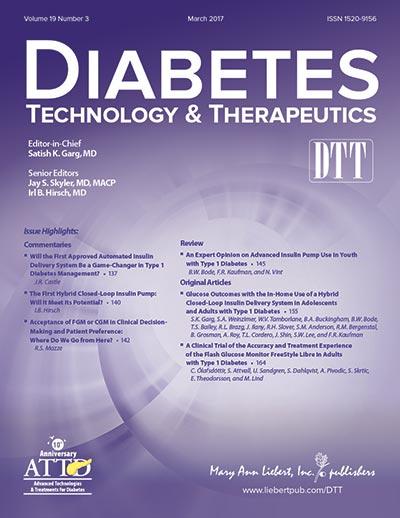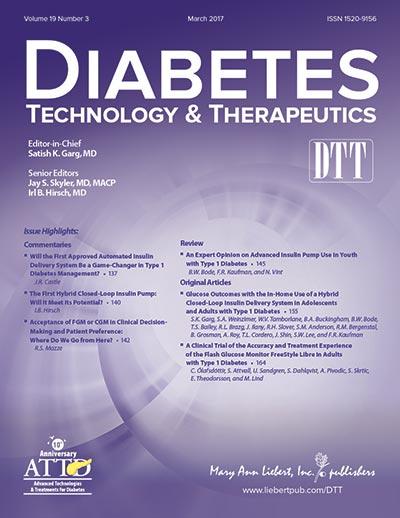
Credit: Mary Ann Liebert, Inc., publishers
New Rochelle, NY, September 21, 2017–Researchers in China who assessed self-monitoring of blood glucose (SMBG) behavior among nearly 19,000 patients with type 2 diabetes treated with oral medications reported very low SMBG rates both before and after the patients began treatment with basal insulin, although the data showed an increase in mean SMBG frequency after 6 months and the percentage of patients who never monitored their blood glucose decreased. The study, which also confirmed that patients who performed SMBG more frequently tended to have lower HBA1c levels, is published in Diabetes Technology & Therapeutics (DTT), a peer-reviewed journal from Mary Ann Liebert, Inc., publishers. The article is available free on the DTT website until October 21, 2017.
Yingying Luo, Yuqian Linong Ji, Peking University People's Hospital, Beijing; Yuqian Bao, Shanghai Jiao Tong University Affiliated Sixth People's Hospital, Shanghai; and Puhong Zhang, Dongshan Zhu, Xian Li, Jiachao, and Heng Zhang, Peking University Health Science Center, Beijing, representing the ORBIT Study Group, coauthored the article entitled "Self-Monitoring of Blood Glucose in Patients with Type 2 Diabetes Before and After Initiating Basal Insulin Treatment in China."
The researchers conducted a prospective analysis using ORBIT study data, comparing SMBG frequency, HbA1c control, and hypoglycemia rates among patients with HbA1c > 7% on oral diabetic agents at the initiation of the study. They collected follow-up measurements at 3 months and 6 months after the patients began using basal insulin.
"Introduction of insulin is usually delayed in real-life in subjects with uncontrolled type 2 diabetes. This study by Luo et al highlights the improvements achieved in glucose control by introduction of any basal insulin," says DTT Editor-in-Chief Satish Garg, MD, Professor of Medicine and Pediatrics at the University of Colorado Denver (Aurora).
###
About the Journal
Diabetes Technology & Therapeutics (DTT) is a monthly peer-reviewed journal that covers new technology and new products for the treatment, monitoring, diagnosis, and prevention of diabetes and its complications. Led by Editor-in-Chief Satish Garg, MD, the Journal covers topics that include noninvasive glucose monitoring, implantable continuous glucose sensors, novel routes of insulin administration, genetic engineering, the artificial pancreas, measures of long-term control, computer applications for case management, telemedicine, the Internet, and new medications. Tables of contents and a free sample issue may be viewed on the Diabetes Technology & Therapeutics (DTT) website. DTT is the official journal of the International Conference on Advanced Technologies & Treatments for Diabetes (ATTD).
About ATTD
The International Conference on Advanced Technologies & Treatments for Diabetes (ATTD) presents top caliber scientific programs that have provided participants with cutting-edge research and analysis into the latest developments in diabetes-related technology. A unique and innovative conference, ATTD brings the world's leading researchers and clinicians together for a lively exchange of ideas and information related to the technology, treatment, and prevention of diabetes and related illnesses.
About the Publisher
Mary Ann Liebert, Inc., publishers is a privately held, fully integrated media company known for establishing authoritative peer-reviewed journals in many promising areas of science and biomedical research, including Thyroid, Metabolic Syndrome and Related Disorders, Journal of Aerosol Medicine and Pulmonary Drug Delivery, Childhood Obesity, and Population Health Management. Its biotechnology trade magazine, GEN (Genetic Engineering & Biotechnology News), was the first in its field and is today the industry's most widely read publication worldwide. A complete list of the firm's 80 journals, books, and newsmagazines is available on the Mary Ann Liebert, Inc., publishers website.
Media Contact
Kathryn Ryan
[email protected]
914-740-2250
@LiebertPub
http://www.liebertpub.com
Original Source
http://www.liebertpub.com/global/pressrelease/new-study-examines-reasons-for-very-low-rates-of-blood-glucose-monitoring-in-type-2-diabetes-in-china/2260/ http://dx.doi.org/10.1089/dia.2017.0040





